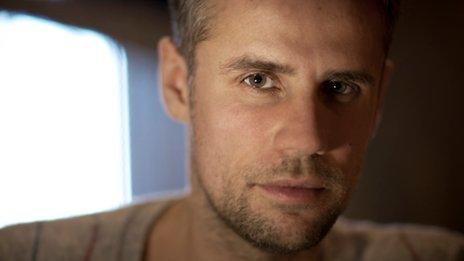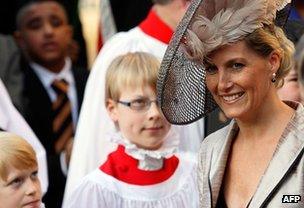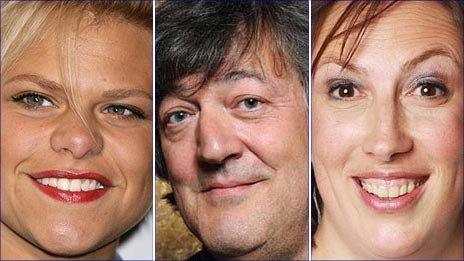Richard Bacon: My battle with the trolls
- Published

There are growing demands for action over internet "trolling". Here BBC presenter Richard Bacon reveals what it's like to deal with a torrent of personal abuse.
You are reading an article online, casting your eye over an essay about a presenter's experiences with internet trolls. It's a fairly straightforward essay. But as you may have noticed, in the cyber world, you don't have to work too hard for things to get a little bit more unpleasant.
I would like you to take part in an experiment. Go to any news website that allows readers to post their own thoughts. Choose the most innocuous celebrity story you can find, and read people's comments beneath.
On the day I wrote this, I nipped onto one such website. The first showbiz story I came across was headlined "Sophie, Countess of Wessex, dishes up a feather hat for a day out with the Queen". The two had been photographed attending a celebratory event at Westminster Abbey. Must be quite hard to get angry about a little piece like that, right?
Wrong.

The feather hat in question
Third reader comment I came across: "Just get rid of this disgusting family now." Another poster reviewed the Queen's outfit from that same photo: "She looks like an evil pink gremlin." And there were masses of negative comments about Kate Middleton - who wasn't even there.
There is something about the alchemy of a keyboard and a public platform that taps into a side of human nature that you rarely, if ever, encounter in real-life conversation.
I don't know the people who made these comments, but I suspect that if any had been at Westminster Abbey that day and Sophie Wessex had wandered over to shake hands, the chit-chat would not have been about her "disgusting" family. I'll go so far as to hazard a guess that it would have been something to the effect of "nice hat, ma'am".
But this sort of negativity, while curious, is entry-level stuff. I've spent three months immersed in the world of cyberbullying and internet "trolling". Recently there has been a massive explosion of it.
Broadcaster Richard Bacon and psychologist Dr Emma Short discuss the typical profile of a cyber troll.
Partly, my journey was personal. Two years ago I came across a charming website which went by the name of "Richard Bacon is a [expletive]".
It's run by this fella who hates me and hates my show on BBC Radio 5 live. Now, there's nothing wrong with that. It's an opinion. As a broadcaster, it's part of the game.
But apart from a running commentary on what he disliked about each day's programme, he would fantasise about my death, daydream about me dying in a plane crash and express his hope that my body would be mangled in a car wreck.
He also took to Twitter under a similarly abusive name.
As the months wore on, he became utterly obsessed. He started posting links full of abuse to my wife, mother and work colleagues. My newborn son even garnered a few mentions.
But this was simply my introduction to the cowardly new world of anonymous internet abuse.
As I delved deeper, it turned out that the level of vitriol I was receiving was mild by comparison with what hundreds, probably thousands, of people around the UK are subjected to daily. Hourly.
Imagine you're the parent of a child who has died in tragic circumstances and you're reading a tribute site dedicated to their memory. Underneath the comments from friends and acquaintances, you stumble upon graphic, violent and sexual abuse from people writing under pretend names. People who their deceased child never even knew.
Reading about these awful stories - and actual abuse - was the moment I began seriously wondering what kind of people would do this, and why. I also wanted to know where the law and the big social networking companies stood when it came to the issue of mocking dead children.
This, I think, is a really important question. Where does freedom of expression cross over into harassment? And what can you do about it?
I've met victims, psychologists, police, devastated families and ultimately come face-to-face with two people who I believe are internet trolls. I also discover that about 50% of victims of anonymous internet abuse know - or knew - their tormentors.
It's even more complex and darker than I ever imagined. Getting straightforward answers to simple questions from internet trolls is all but impossible.
And I started to ponder an even bigger question, one that ties together the violent abuse I look at in this programme and the unnatural level of strident opinions you see posted on almost every internet forum.
Does the net exaggerate our views, or are these views that people really hold? Either way, perhaps we can comfort ourselves with the idea that they are a tiny but vocal minority.
Or maybe this is what we are really like. Perhaps our day-to-day social interactions are the artifice, and these forums expose a dreadful truth about human nature. Could it be that deep, deep down, we just aren't very nice?
- Published14 September 2011
